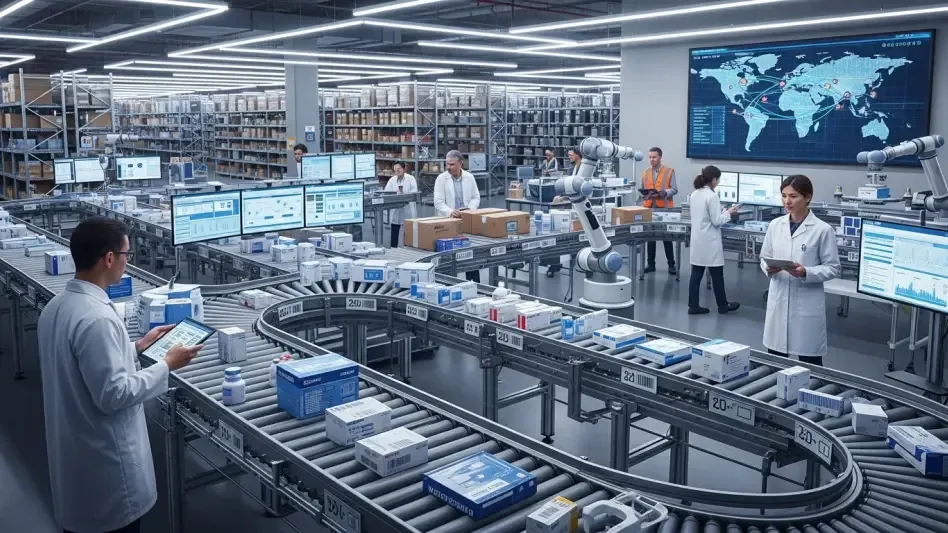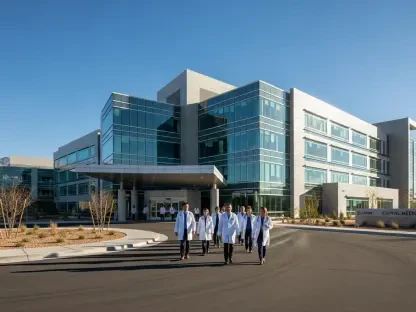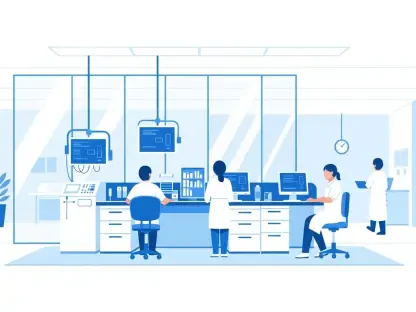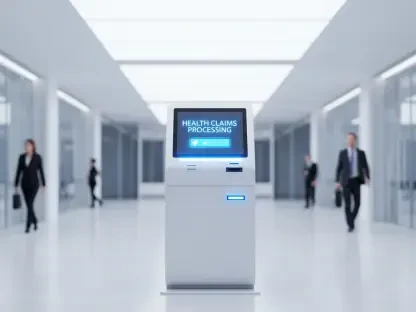Setting the Stage for Healthcare Logistics Evolution
In an era where timely delivery of life-saving pharmaceuticals and medical devices can mean the difference between recovery and crisis, the healthcare logistics industry stands as a critical backbone of global health systems, facing unprecedented pressure with the soaring demand for temperature-sensitive biologics and personalized treatments. This dynamic landscape sets the stage for a transformative shift as UPS, a titan in global logistics, makes a bold move to redefine its role in this vital sector through a strategic acquisition.
The healthcare logistics industry is not merely about transportation; it encompasses a complex web of services ensuring that critical supplies reach their destinations intact and on time. From cold chain management for vaccines to secure handling of diagnostic materials, the stakes are extraordinarily high. Major players like UPS, FedEx, and DHL dominate this space, navigating challenges such as stringent regulations and the need for cutting-edge technology to maintain product integrity across vast distances.
Diving into the Current Healthcare Logistics Environment
The healthcare logistics sector is segmented into specialized areas like cold chain logistics, third-party logistics, and clinical trial support, each requiring tailored solutions to meet unique demands. Cold chain logistics, for instance, ensures temperature-sensitive products like insulin or chemotherapy drugs remain viable during transit. Meanwhile, third-party logistics providers streamline supply chains for healthcare companies, and clinical trial support ensures research materials are delivered under strict protocols, often across borders.
Technological advancements are reshaping this industry at a rapid pace. Innovations such as IoT-enabled tracking systems provide real-time visibility into shipment conditions, while automation in warehousing enhances efficiency and reduces human error. These tools are critical as regulatory requirements, including Good Distribution Practices (GDP), demand meticulous documentation and adherence to standards, pushing companies to invest heavily in compliance and infrastructure.
A significant driver of change is the growing complexity of healthcare products themselves. Biologics, gene therapies, and personalized medicines require precise handling, often under extreme temperature controls, making logistics a linchpin in patient outcomes. As the industry evolves, the interplay of technology, regulation, and product sophistication continues to challenge even the most established players to adapt swiftly.
UPS’s Bold Acquisition of AHG
Unpacking the Deal’s Structure and Intent
On November 3, UPS announced a landmark acquisition of Andlauer Healthcare Group Inc. (AHG), a Canadian leader in healthcare logistics, for approximately USD $1.6 billion (CAD $2.2 billion). The deal offers AHG shareholders CAD $55.00 per share in cash, signaling UPS’s aggressive push into specialized healthcare services. This acquisition is a calculated step to fortify UPS Healthcare’s capabilities in a market where precision and expertise are paramount.
AHG brings to the table a wealth of experience in customized third-party logistics and cold chain transportation, areas critical to handling sensitive healthcare products. This expertise aligns seamlessly with UPS’s strategic vision of enhancing its offerings in a sector where delays or mishandling can have dire consequences. By absorbing AHG’s specialized infrastructure, UPS aims to position itself as an indispensable partner to pharmaceutical and medical device companies.
Anticipated Advantages and Industry Ripples
Integrating AHG’s robust cold chain network is expected to significantly reduce transit times for temperature-sensitive shipments, a crucial factor in maintaining product efficacy. Enhanced end-to-end visibility through AHG’s systems will also allow UPS Healthcare to provide clients with real-time updates, fostering trust and reliability. Furthermore, this acquisition expands UPS’s global footprint, enabling better service delivery across North America and beyond.
The market impact of this move is poised to be substantial, particularly given the rising demand for temperature-controlled logistics in pharmaceuticals and medical devices. Industry trends suggest a compound annual growth rate in this segment of over 7% from this year to 2027, driven by innovations in biologics and an aging population. UPS is well-positioned to capitalize on this growth, leveraging AHG’s niche capabilities to capture a larger share of this lucrative market.
Analysts view this acquisition as a strategic fit that could set a new standard for service quality in healthcare logistics. By combining AHG’s targeted expertise with UPS’s vast operational scale—spanning over 200 countries and managing 17 million square feet of compliant distribution space—the company is likely to redefine benchmarks for efficiency and reliability in the industry.
Navigating the Hurdles of Healthcare Logistics Expansion
Scaling operations in healthcare logistics presents formidable challenges, particularly with high-value, temperature-sensitive shipments. Risks such as spoilage due to temperature excursions, delays caused by customs bottlenecks, or compliance failures can jeopardize entire supply chains. These issues are magnified when operating across diverse regions with varying infrastructure and regulatory landscapes.
Technological and infrastructural barriers further complicate the maintenance of cold chain integrity. Many regions lack the necessary refrigerated storage or reliable power grids, making consistent temperature control a daunting task. UPS will need to address these gaps by investing in portable cooling technologies and robust backup systems to ensure product safety during transit disruptions.
To overcome these obstacles, strategic investments in advanced monitoring systems, such as IoT sensors for real-time data, could prove vital. Additionally, expanding the network of GDP-compliant facilities will be essential to meet global demand. UPS’s ability to deploy capital and expertise on a large scale may provide a competitive edge in tackling these persistent challenges.
Regulatory Maze and Compliance Demands
The healthcare logistics industry operates under a stringent regulatory framework designed to protect patient safety and product integrity. Standards for temperature control, adherence to Good Distribution Practices, and robust data security protocols are non-negotiable, with violations carrying severe penalties. These rules ensure that every step of the supply chain, from storage to delivery, meets exacting criteria.
For UPS and AHG, navigating compliance across North America and global markets requires meticulous planning and execution. Harmonizing practices to align with varying regional regulations—such as those enforced by the FDA in the U.S. or Health Canada—demands significant resources. Both companies must prioritize training, audits, and technology to uphold standards while minimizing operational disruptions.
Regulatory changes often lead to increased operational costs, as firms must update systems or retrofit facilities to meet new guidelines. However, UPS’s extensive resources and global presence could provide an advantage in absorbing these costs compared to smaller competitors. This scale may enable faster adaptation to evolving rules, ensuring consistent service quality across markets.
Projecting UPS’s Role in Healthcare Logistics Future
The acquisition of AHG positions UPS as a frontrunner in addressing emerging needs within healthcare logistics, particularly for personalized medicine and biologics. These advanced treatments often require ultra-low temperature storage and specialized handling, areas where AHG’s expertise will enhance UPS’s service portfolio. This strategic alignment prepares UPS to meet the nuanced demands of cutting-edge medical advancements.
Emerging technologies like AI-driven logistics planning and blockchain for supply chain transparency offer further potential to elevate UPS’s offerings. AI can optimize delivery routes and predict potential disruptions, while blockchain ensures tamper-proof records of shipment conditions. Adopting these innovations could solidify UPS’s reputation as a leader in secure and efficient healthcare logistics.
Global trends, such as increased healthcare spending and aging populations, are expected to drive sustained demand for specialized logistics services. With projections indicating a steady rise in healthcare expenditure through 2027, UPS stands to benefit from this growth trajectory. The AHG acquisition equips the company to address these long-term shifts with agility and precision.
Reflecting on a Milestone in Healthcare Logistics
Looking back, the UPS acquisition of AHG marked a defining moment that reshaped the contours of healthcare logistics through enhanced service quality and expanded global reach. The integration of AHG’s cold chain expertise with UPS’s vast infrastructure created a synergy that elevated industry standards. Leadership continuity, with Michael Andlauer at the helm of UPS Canada Healthcare, ensured that specialized knowledge drove innovation during this transition.
Moving forward, stakeholders should focus on leveraging this partnership to pioneer solutions for emerging challenges, such as ultra-cold storage for next-generation therapies. Investments in technology, particularly in predictive analytics and secure data systems, will be crucial to maintaining a competitive edge. This deal not only set a benchmark for excellence but also signaled a broader trend of consolidation and specialization in the sector.
As the industry continues to evolve, collaboration between logistics providers and healthcare entities will be essential to address complex demands. UPS’s strategic foresight in this acquisition offers a model for balancing scale with precision, paving the way for future advancements. The emphasis now lies in building resilient systems that anticipate global health needs, ensuring that critical supplies reach those who need them most, without fail.









